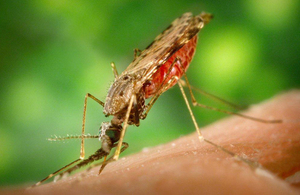MHRA contributing to the global fight against Zika
The WHO has declared Zika a "public health emergency of international concern." MHRA is part of the global coalition responding to the outbreak.

Mosquito
The Medicines and Healthcare products Regulatory Agency (MHRA), as a member of the International Coalition of Medicines Regulatory Authorities (ICMRA), has pledged its support to the World Health Organization (WHO) in countering the Zika outbreak.
Zika is a mosquito-borne ‘Flavivirus’, part of the same family as yellow fever and dengue, and generally causes very mild symptoms. Most people with Zika get only a slight fever and rash. Others may also get conjunctivitis, muscle and joint pain, and feel tired. The symptoms usually finish in 2 to 7 days. Many people don’t show any symptoms at all.
Agencies investigating Zika outbreaks are finding an increasing body of evidence linking the Zika virus to severe birth defects such as microcephaly, a neurological disorder which results in babies being born with abnormally small heads. It causes severe developmental issues and sometimes death. An association with Guillain-Barre syndrome has also been reported.
As the ‘Aedes’ mosquitoes which carry the Zika virus are not found in the United Kingdom, Zika virus does not occur naturally here, and the risk to the general public in the UK remains extremely low. The very few cases which have been reported in the UK have been contracted overseas, and Public Health England has issued advice to those who are planning to travel to areas where there is currently active Zika virus transmission. There is currently no vaccine to prevent Zika or medicine to treat the infection.
ICMRA brings together 21 medicines regulators from every region in the world, and its members are working together to fight against Zika; building on ICMRA’s collaborative work on Ebola.
MHRA has set up an incident group with personnel across the agency. We are actively involved in responding to this emergency with offer of help with early phase clinical trials, scientific advice and rapid evaluation of both clinical trials and the development of vaccines. The incident group has established contacts and interactions with WHO, EMA, the ICMRA Zika Network and the EU wide group for Zika.
Within MHRA, the National Institute for Biological Standards and Control (NIBSC) has responded immediately to the WHO request to develop and evaluate reference preparations for Zika.
NIBSC is currently working with the WHO and colleagues from other WHO designated collaborating centres to produce materials for and undertake international collaborative studies that will result in the production of:
- an international standard for Zika virus RNA to enable accurate diagnosis of active infection
- an international standard for Zika virus antibodies to enable accurate diagnosis for those exposed to the virus
- an international standard for Zika antigen for use in rapid point of care assays
Diagnosis is hampered by the relatively small period in which the virus can be detected in the blood and other body fluids. Scientists look for antibodies produced by the body to fight off Zika but current tests cannot readily distinguish between the antibodies produced to fight Zika and those caused by other flaviviruses carried by the same mosquitoes.
The standards being created by NIBSC will help researchers, product developers, and regulatory authorities benchmark the multiple diagnostic tests for Zika that are currently under development. It is hoped that this work will accelerate the creation of vaccines or treatments.
MHRA is also taking action as the regulator of medicines. We’ve worked where necessary to remove from sale an unregistered homeopathic medicine claiming to be a treatment for Zika.
Zika is a global public health emergency but with the ICMRA coalition of world-leading scientists and regulators working together to understand the virus, how it works and how we can control it, we’re in with a fighting chance.
In the interim, follow the travel advice issued by Public Health England, and if you are pregnant and are concerned you may have Zika virus disease, consult your doctor for close monitoring during your pregnancy.